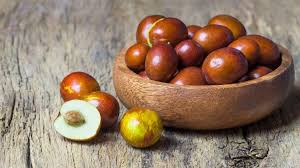Žižole—also known as jujube or Chinese date—might not be the first fruit that comes to mind when you think of health foods, but it should be. This ancient, sweet-and-tart fruit has been a staple in traditional medicine and culinary culture across Asia and the Mediterranean for centuries.
Whether you’re a wellness enthusiast or a food explorer, learning about žižole will surprise you with its benefits, versatility, and fascinating history.
2. What Are Žižole?
Žižole are small, reddish-brown fruits from the Ziziphus jujuba tree. Native to Asia but widely cultivated in southern Europe—especially coastal Croatia and Italy—they are often dried or eaten fresh.
Depending on the ripeness, žižole can taste like a mix of apple and date. They’re chewy, nutrient-rich, and perfect for snacking or adding to dishes.
Common Names:
- Žižole (Croatian/Slovenian)
- Jujube (English)
- Zizyphus (botanical)
- Chinese date
3. History and Cultural Origins
Žižole have a rich legacy that dates back more than 4,000 years. In China, the fruit has been revered in traditional medicine and cuisine. In the Mediterranean, especially along the Dalmatian coast, žižole trees are found in family gardens and are a part of local folklore and tradition.
The fruit symbolizes longevity, health, and protection in many cultures.
4. Nutritional Value of Žižole
These small fruits pack a nutritional punch. Here’s a look at what makes žižole a superfood:
- Vitamin C: Boosts immunity
- Potassium: Supports heart health
- Antioxidants: Fights free radicals
- Flavonoids and Saponins: Linked to anti-inflammatory effects
- Fiber: Aids digestion
Per 100g (fresh):
- Calories: ~79
- Vitamin C: ~69mg
- Carbohydrates: ~20g
- Fiber: ~2.6g
When dried, the sugar and calorie content increase significantly—similar to dates.
5. Health Benefits of Žižole
Here are the evidence-based reasons to include žižole in your diet:
1. Supports Sleep and Reduces Anxiety
Compounds in žižole like jujubosides may help relax the nervous system, improving sleep quality and reducing stress.
2. Boosts Immunity
With high levels of vitamin C and antioxidants, žižole strengthens your immune response and reduces oxidative damage.
3. Improves Digestion
Žižole are rich in fiber, which promotes healthy bowel movements and gut flora balance.
4. Anti-Inflammatory Properties
Their bioactive compounds may help reduce chronic inflammation, supporting heart and liver health.
5. May Help Manage Blood Sugar
Some studies suggest that jujube extracts help stabilize blood sugar levels, making them a healthy alternative to processed snacks.
6. How to Eat and Use Žižole
Whether fresh, dried, or turned into tea, žižole are incredibly versatile.
Popular Uses:
- Fresh: Eaten raw like apples when unripe
- Dried: Used like dates in baking or energy bars
- Žižole Tea: Made from dried slices, often used for relaxation
- In Cooking: Great for stews, chutneys, or syrups
- In Traditional Medicine: Used as a tonic for stress and immunity
Try adding žižole to oatmeal, smoothies, or herbal blends.
7. Growing Žižole at Home
The Ziziphus jujuba tree is hardy and drought-tolerant, making it ideal for Mediterranean and temperate climates.
Growing Tips:
- Requires full sun
- Well-drained soil
- Low maintenance once established
- Produces fruit after 2–3 years
- Harvested in late summer to early fall
It’s a great addition to home gardens with minimal care.
8. Where to Buy Žižole
Žižole may not be mainstream in supermarkets, but you can find them in:
- Local markets in southern Europe
- Asian grocery stores (under “jujube”)
- Herbal shops and apothecaries
- Online retailers offering dried žižole or tea blends
Look for organic, non-sulfur-treated varieties when shopping dried versions.
9. Conclusion
Though often overlooked, žižole are a nutritional gem with centuries of proven benefits. Whether you’re looking to support your immune system, improve your sleep, or simply enjoy a new natural treat, žižole are worth adding to your pantry.
Rooted in tradition and backed by science, this small fruit offers big value for wellness and culinary diversity.
10. FAQ
Q1: What do žižole taste like?
When fresh, they taste like a cross between an apple and date. Dried žižole have a more concentrated sweetness.
Q2: Can I eat žižole every day?
Yes, in moderation. Their high antioxidant and vitamin content make them a healthy daily snack.
Q3: Are žižole the same as dates?
No. Although sometimes called “Chinese dates,” žižole come from a different tree and have different properties.
Q4: Is žižole tea safe for children?
Generally yes, especially if unsweetened. But consult a pediatrician for regular use.
Q5: Do žižole have any side effects?
They are safe for most people. In rare cases, excess consumption may cause digestive discomfort due to fiber content.

